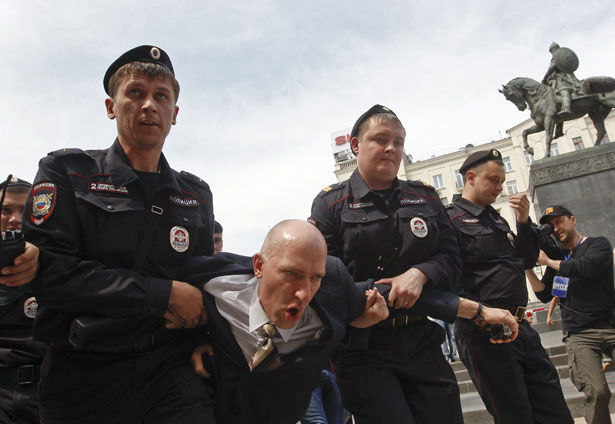
Russian police detain a gay rights activist during a rally outside the mayor’s office in Moscow, May 25, 2013. (Reuters/Maxim Shemetov)
Editor’s Note: Each week we cross-post an excerpt from Katrina vanden Heuvel’s column at the WashingtonPost.com. Read the full text of Katrina’s column here.
In the run-up to the 2014 Winter Olympics in Sochi, Russia, the Kremlin is getting torched.
An international chorus of critics has assailed Vladimir Putin’s government for enacting a law that bans any discussion of lesbian, gay, bisexual or transgender (LGBT) relationships, rights and issues wherever children might be present. Many protesters are calling for a global response.
In a New York Times op-ed, actor and playwright Harvey Fierstein argued that a boycott of the Sochi Olympics would pressure the Russian government into reconsidering its treatment of gay men and lesbians. British actor Stephen Fry wrote an impassioned letter to British Prime Minister David Cameron, urging an Olympic boycott as well. American author Dan Savage launched a popular #DumpRussianVodka campaign.
There is a reason that everyone from Lady Gaga to President Obama has spoken out against Russia’s new anti-gay law: it is discriminatory and inhumane, and many people are desperate to do something, anything, to show solidarity with Russia’s LGBT community and help get the law repealed.
Yet it’s not all that clear whether today’s clamor, however well-intentioned, will improve the lives and human rights of gay people in Russia. Unless we take the time to understand the reasons behind the ascendance of hyper-conservative traditionalist values in Russia and then develop a more strategic response, we may instead strengthen the already powerful nationalist forces in the country.
Editor’s Note: Each week we cross-post an excerpt from Katrina vanden Heuvel’s column at the WashingtonPost.com. Read the full text of Katrina’s column here.


